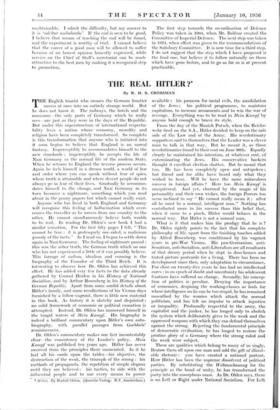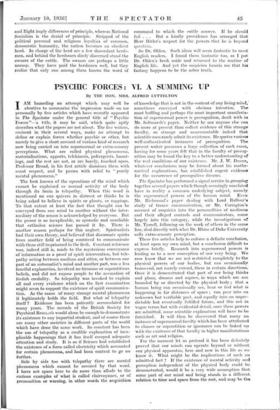THE REAL HITLER ?*
By It H. S. CROSSMAN THE English tourist who crosses the German frontier moves at once into an entirely strange world. But he does not know it. The railways, the hotels and the museums—the only parts of Germany which he really sees—are just as they were in the days of the Republic. But under this superstructure of international respecta- bility lives a nation whose economy, morality and religion have been completely transformed.. So complete is this transformation that anyone who is initiated into it soon begins to believe that England is an unreal fantasy. Imperceptibly he accommodates himself to the new standards : imperceptibly he accepts the life of Nazi Germany as the normal life of the modern State. When he returns to England the reverse process occurs. Again he feels himself in a dream world, a world of law and order where you can speak without fear of spies; where truth is attainable and where decent people do not always go in fear of their lives. Gradually he accommo- dates himself to the change, and Nazi Germany in its turn becomes a nightmare, something which you read about in the penny papers but which cannot really exist.
Anyone who has lived in both England and Germany will recognise this feeling of hallucination which over- comes the traveller as he moves from one country to the other. He cannot simultaneously believe both worlds to be real. In reading Dr. Olden's new book I had a similar sensation.• For the first fifty pages I felt, " This cannot be true : it is grotesquely one-sided, a malicious parody of the facts." As I read on, I began to settle down again in Nazi Germany. The feeling of nightmare passed : this was the sober truth, the German truth which no one who has not experienced a little of it can possibly believe. This farrago of sadism, idealism and cunning is the biography of the Founder of the Third Reich.. It is interesting to observe how Dr. Olden has achieved this effect. He has added very few facts to the data already gathered by Conrad Heiden in his History of National Socialism, and by Arthur Rosenberg in his History of the German Republic. Apart from some sordid details about Hitler's family, and some recollections of his Vienna days furnished by a fellow-vagrant, there is little new material in this book. As history it is sketchy and disjointed : no solid framework of economic or political causation is attempted. Instead, Dr. Olden has immersed himself in the turgid waters of Mein Kampf. • His biography is indeed a brilliant commentary upon Hitler's own auto- biography, with parallel passages from Goebbels' reminiscences.
Dr. Olden's commentary makes one fact incontestably clear—the consistency of the Leader's policy. Mein Kampf was published ten years ago. Hitler has never swerved from the principles there enunciated. In it he laid all his cards upon the tables-his objective, the destruction of the weak, the triumph of the strong : his methods of propaganda, the repetition of simple slogans until they are believed : his tactics, to side with the influential people- and to use every means to power *Hitler. By Rudolf Olden. (Querido Verlag: N.V. Amsterdam.) available ; his panacea for social evils, the annihilation of the Jews ; his political programme, to maintain capitalism, to increase armaments and to win the war of revenge. Everything was to be read in Mein Kampf by anyone bold enough to brave its style.
From the day of the Munich Putsch, when the Reichs- wehr fired on the S.A., Hitler decided to keep on the safe side of the Law and of the Army. His revolutionary supporters said to themselves that the Leader was a clever man to talk in that way. But he meant it, as those revolutionaries found to their cost on June'30th. Equally clearly he maintained his intention, at whatever cost, of exterminating the Jews. His conservative backers thought it excellent election chatter. But he meant that too. He has been completely open and outspoken ; but friend and foe alike have heard only what they wished to hear. Will he have the same miraculous success in foreign affairs ? Here too Mein Kanzpf is.
unequivocal. And yet, charmed by the magic of his personality and their own wishes, the foreign Powers too seem inclined to say " He cannot really mean it-: after all lie must be a normal, intelligent man." Nothing has contributed more to his success than this belief that, when it came to a pinch, Hitler would behave in the normal way. But Hitler is not a normal man.
What is it that makes him . the prodigy that. he is ? Dr. Olden rightly points to the fact that his complete philosophy of life, apart from the. finishing touches added by Alfred Rosenberg, was conditioned by his vagrant years in pre War Vienna. His pan-Germanism; anti- Semitism, anti-Socialism, anti-Liberalism are all resultants of that dreary period when he slept in doss-houses and tinted picture postcards for a living. There has been no development since then, only adaptation to circumstance.
For close on twenty-five years he has had: no intellectual cares : in an epoch of doubt and uncertainty his adolescent fixations have suffered no change. Secondly, his concep- tion of . politics is peculiar. Denying the importance of economics, despising the working-classes as fools for whose intelligence no lie can be too stupid, he has remained unscathed by the worries which attack the normal politician; and has felt no impulse to attack injustice or inequality. Profoundly respectful to the army, the capitalist and the junker, he has longed only to abolish the system which deliberately gives to the weak and the oppressed weapons with Which they can defend themselves against the strong. Rejecting the fundamental principle of democratic civilisation,- he has longed to restore the pristine glory of a Germany where the strong ruled and the weak were subject.
These are qualities which belong 'to many of us singly. Bestow them all upon one-man and add the gift of illimit- able rhetoric : you have created a national portent. Herr Hitler has been the 'supreme diSsolvent of political parties. By substituting the Weltanschauung for the principle as the bond of unity, he has transformed the party into the amorphous mass. As Dr. Olden says, there is no Left or Right under National Socialism.-- For Left and Right imply differences of principle, whereas National Socialism is the denial of principle. Stripped of the political personal and religious loyalties of common, democratic humanity, the nation becomes an obedient herd. In charge of the herd are a few discordant herds- men, and behind the herdsmen dimly discerned stand the owners of the cattle. The owners are perhaps a little uneasy. They have paid the herdsmen well, but they realise that only one among them knows the word of command to which the cattle answer. If he should fail . . . But a kindly providence has arranged that Herr Hitler's respect for the powers that be is beyond question.
So Dr. Olden. Such ideas will seem fantastic to most English readers. I found them fantastic too, as I put Dr. Olden's book aside and returned to the routine of English life. And yet the suspicion haunts me that his fantasy happens to be the sober truth.











































 Previous page
Previous page